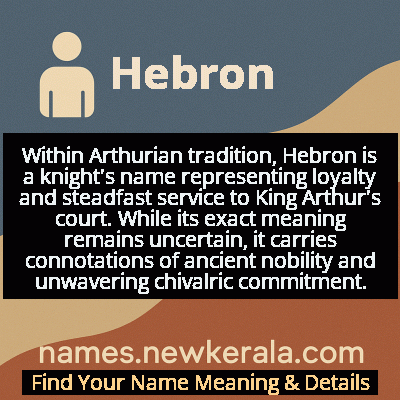Hebron Name Meaning & Details
Origin, Popularity, Numerology Analysis & Name Meaning of Hebron
Discover the origin, meaning, and cultural significance of the name HEBRON. Delve into its historical roots and explore the lasting impact it has had on communities and traditions.
Name
Hebron
Gender
Male
Origin
Arthurian
Lucky Number
8
Meaning of the Name - Hebron
Within Arthurian tradition, Hebron is a knight's name representing loyalty and steadfast service to King Arthur's court. While its exact meaning remains uncertain, it carries connotations of ancient nobility and unwavering chivalric commitment.
Hebron - Complete Numerology Analysis
Your Numerology Number
Based on Pythagorean Numerology System
Ruling Planet
Saturn
Positive Nature
Ambitious, efficient, realistic, and authoritative.
Negative Traits
Materialistic, stressed, confrontational, and can be overly ambitious.
Lucky Colours
Dark blue, black.
Lucky Days
Saturday.
Lucky Stones
Blue sapphire, amethyst.
Harmony Numbers
2, 4, 6.
Best Suited Professions
Business leaders, managers, financial services, law enforcement.
What People Like About You
Leadership, determination, organizational skills.
Famous People Named Hebron
Hebron of Lyonesse
Arthurian Knight
Minor knight in Arthurian legends, known for loyalty to King Arthur's court
Sir Hebron
Literary Knight
Appears in later Arthurian romances as a noble knight of the Round Table
Hebron the Steadfast
Mythical Warrior
Known in Welsh Arthurian tales for unwavering courage in battle
Name Variations & International Equivalents
Click on blue names to explore their detailed meanings. Gray names with will be available soon.
Cultural & Historical Significance
Within the Arthurian canon, Hebron characters often serve as background figures who nevertheless demonstrate key chivalric virtues. Their presence in various manuscripts suggests the name carried enough cultural weight to be included among Arthur's retinue, though never achieving the prominence of Lancelot or Gawain. This positioning makes Hebron an interesting study in how Arthurian writers used names to create depth and historical resonance in their works. The name serves as a reminder that Camelot's strength lay not only in its famous heroes but also in its countless loyal knights who formed the foundation of Arthur's reign.
Extended Personality Analysis
Individuals named Hebron in Arthurian contexts are typically characterized by unwavering loyalty and steadfast determination. They embody the medieval ideal of the faithful vassal, displaying deep commitment to their oaths and causes. This creates a personality profile of reliability and moral fortitude, where the character consistently prioritizes duty and honor above personal ambition or comfort.
Beyond mere loyalty, Hebron characters often demonstrate quiet wisdom and practical judgment. They are not typically the flashiest knights or most celebrated heroes, but rather the dependable supporters who provide stability to Arthur's court. This suggests a personality that values substance over show, with a strong sense of justice and the patience to see long-term goals through to completion. Their strength lies in consistency rather than dramatic heroics, making them the steady hand in times of crisis and the voice of reason in moments of passion.
Modern Usage & Popularity
In contemporary times, Hebron remains an extremely rare given name, primarily used by enthusiasts of Arthurian literature or medieval history. Its usage is almost exclusively masculine and tends to be concentrated among families with strong interests in Celtic mythology or chivalric traditions. The name has never appeared in modern baby name popularity charts and maintains a niche, almost academic appeal rather than mainstream usage. Recent years have seen slight increases in its use within historical reenactment communities and among parents seeking unique names with literary depth, though it remains well outside the top 1000 names in any English-speaking country.
Symbolic & Spiritual Meanings
Symbolically, Hebron represents the virtues of loyalty, steadfastness, and quiet strength. In Arthurian context, it embodies the ideal of the reliable supporter rather than the celebrated hero—the knight who forms the backbone of Camelot's chivalric society. The name carries connotations of ancient wisdom and enduring commitment, suggesting someone who builds foundations rather than seeking glory. Metaphorically, it represents the strength found in consistency and the power of unwavering principles in a changing world, serving as a reminder that true nobility often lies in faithful service rather than spectacular achievement.

